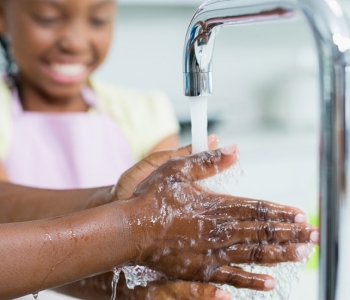Beyond Virtual Fieldtrips: Distance Learning During Coronavirus School Closures

Coronavirus, or COVID-19, has turned the world as we know it upside down, to say the least. Millions of families are trying to keep the learning alive at home amid virus-related school closures—even while they attempt to adjust to their own new work-from-home realities, stock up on household essentials, and do everything in their power to keep their loved ones healthy. Frankly? It’s a lot.
The good news is that even though you’re social distancing (staying in when possible and keeping at least six feet away from those not in your household), you’re absolutely not alone in this struggle. We talked to a few teachers who’ve been there, done that, and they had some amazingly practical advice for how everyday families can get through this difficult time.
Put Family and Feelings First
These are trying times at best, and the fact is, not all
families can make schooling their immediate priority. “Keeping your
sanity right now and making sure your children are fed and healthy is,
honestly, the first thing you should be focused on right now,” says
Dr. Cyndy Karras, an Austin-based developmental psychologist and veteran teacher.
Academics are, of course, important, she says, “but these are
unprecedented times, and it’s OK to just pause and take a beat to get
your family’s mental health on track, if that’s what’s needed. Once
you’ve got the social-emotional part under control, the academics and
learning will follow.” And if every single item on your girl’s school
checklist doesn’t get accomplished while she’s learning from home? So
be it. “Her academic future is not going to be damaged by this time
away from a traditional classroom. Just take a deep breath and do the
best you can.”
Give Kids a Choice and a Voice
Sarah Scheldt, a Brooklyn-based parenting coach
and veteran elementary school teacher, says it’s important to include
your girl when you’re coming up with solutions to new challenges in
your family. “Bring your household together to write up a family plan
that everyone can agree on—maybe you’ll say the kids will focus on
homework packets or read during certain times of the day, and other
blocks of time they can choose from a variety of fun activities you
come up with together,” she suggests. “These are complicated times,
and it’s OK to tell your kids that you need their help and their
ideas. Talk about not only what you need from them, but make sure you
ask what they need from you. In fact, when you do that, you’re not
just getting them to feel more ownership of the plan, you’re teaching
them about responsibility, cooperation, and teamwork. Later, if
they’re not following the plan, you can revisit what you agreed on
together to help get everyone back on track.”
You’re Not Going to Replicate the Classroom Experience, and That’s OK
If your girl’s school is offering online classes, that’s great,
and she should participate in them as much as possible, but it’s
unrealistic to think kids are going to get the same experience from
these as they would at school, says Melissa Abrahams, an elementary
school teacher in Southern California. “It’s not helpful to pretend
that everything is normal right now, because that’s not the reality,
and your girl knows that. If she is having trouble focusing, give her
a break to do something that doesn’t feel like school,” she says.
“Watch a movie together and ask her what she thinks is going to happen
to the characters next and why—that’s critical thinking, or play a
board game that involves math and strategy. She’ll be learning without
even thinking about it.” This teacher’s favorite non-school activity
for kids being temporarily home-schooled? Keeping a diary. “There’s a
lot going on right now that your girl might want to write about so she
remembers it later. Plus, it’s a healthy outlet for some of the
emotions she’s dealing with, and she’ll be practicing her language
skills at the same time.”
Ask for Help with That Homework Packet
What happens if your girl’s teacher sent home a packet of work,
but you don’t have a clue about how to help your girl with it? “Be
honest with your child and let her know that you don’t know all the
answers,” says Dr. Karras. “When you admit that you’re not sure how to
explain something to her—but that you’re going to find out
together—she’ll start to see you as a team and feel even more
supported by you.” Then reach out to your social networks, friends who
may have expertise in that subject, or even parents and caregivers of
other students in your girl’s class. “The reason why there are so many
free resources for distance learning right now is because people know
these are difficult times and really want to help in whatever way they
can. You are absolutely not alone.”
Keep It Bite-Sized and Kid-Friendly
If you had visions of your girl sitting at the kitchen table,
studying for two or more hours at a time, Scheldt says you might be
asking a bit much of her. “For kids ages six through twelve, it’s far
more realistic to have them do focused work for 20 minutes at a time
or so and then take a brain break with something else that’s quick and
fun.” As for what your girl should be learning about beyond any formal
homework, Scheldt says to let your girl decide. “If she’s into a
certain TV show, movie, or book, she could use household items to make
puppets of the characters and act out the story. Or if she loves a
certain family recipe, you can teach her how to make it. Have her
count how many eggs you’re using. Ask her why she thinks certain
ingredients are needed. This is a lesson in following directions,
chemistry, math, and a big dose of family traditions all rolled into one.”





